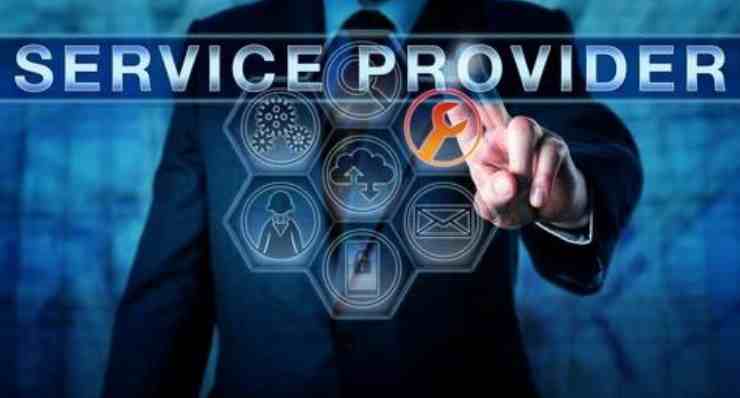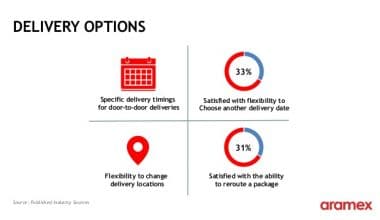Companies find it very difficult to manage their IT infrastructure and this can be very detrimental to a company’s growth. However, there are companies that take care of these problems by providing the necessary services and resources. IT service providers are companies who provide IT components to other businesses. In this article, we provide a list of top IT and managed service providers that will work to your advantage. There are IT service providers who work for small businesses.
What Is IT Service Provider?
An IT service provider is a company that regularly maintains and manages an organization’s IT systems, infrastructure, and end-user systems. They can be a third-party or outsourced vendor, while also being a division of the company (internal team).
IT service providers may deliver their native services in collaboration with other MSPs or focus on a single vendor or technology.
An IT service provider typically uses a different distribution strategy from traditional IT product (developers or manufacturers) support. They typically do not demand that a user or business buy an IT product. Instead, it creates, runs, and manages IT products that are packaged and offered as services. A consumer then uses a variety of sourcing methods, such as an on-demand, monthly, or yearly subscription price, to gain access to the solution from a service provider.
Different types of IT service providers include
- Independent Provider.
- Internal IT Department.
- Managed IT Service Provider.
Why Do You Need an IT Service Provider?
IT service providers may be crucial to businesses in different ways:
#1. Reducing Cost
Employing IT service providers enables businesses to make significant financial savings. When a company buys bundled services, they can save more money. Companies save considerable amounts of money on technology, maintenance, repairs, security, and data recovery by purchasing bundled services.
#2. Data Backup and Recovery
Server crashes and recovery efforts can be costly. A straightforward, out-of-pocket drive or data recovery can cost thousands of dollars, whether it is successful or not. Having an IT service provider on hand in this situation might be beneficial for data recovery services.
#3. They Have the Experience and Knowledge
IT service providers must maintain their compliance with suppliers like IBM, Microsoft, Dell, Cisco, and others, as well as their certifications. Additionally, they have bigger specialist teams in the key IT divisions than a company’s internal workforce.
#4. On-demand Assistance & Service
The services of IT service providers can be accessed whenever you need them. Finding and interviewing IT repair shops for their IT service needs can be challenging for businesses without bundled IT services from SPs.
#5. Cyberthreats and Cloud Security
Data security is more crucial than ever because businesses are now handling their sensitive data in the cloud. Therefore, corporate data and information protection cannot be left to internal teams, making IT and network security services today’s most in-demand technical services.
There were 304.7 million ransomware assaults in the first half of 2021. The number of cyberattacks increased by 151% from the previous year. Corporations are the subject of ransomware and cyberattack every 39 seconds. The quick shift to working from home and remote work schedules is exploited by cybercriminals.
#6. Strategic Planning for Emergencies
IT service providers also assist businesses with disaster preparedness as part of their Technology Roadmap. Setting up an IT strategy with IT services suited to your company’s requirements helps you achieve your business objectives and effectively.
Managed IT Service Provider
A managed service provider (MSP) is a third-party business that remotely administers an end user’s IT infrastructure and applications. MSPs are usually employed by small and medium-sized businesses (SMBs), charitable organizations, and governmental organizations to carry out a specific range of ongoing management tasks. The services they offer include
- Network and infrastructure management
- Security
- Monitoring.
MSPs frequently carry out their duties online from a distance. In order for customer companies to concentrate on developing their services without being concerned about protracted system outages or service interruptions, MSPs frequently perform administration services on a regular basis. While some MSPs may focus on particular IT subfields, like data storage, others may concentrate on particular vertical sectors, including law, finance, healthcare, or manufacturing. For instance, managed security service providers provide specialized services like remote firewall management and other security-as-a-service options.
What Do Managed Service Providers Do?
MSPs take care of the difficult, time-consuming, or monotonous tasks related to managing end-user systems or IT infrastructure. They usually carry out the following:
- MSPs may offer their own native services, those of other providers, or a hybrid combination of the two. Pure-play MSPs primarily offer their own native services and concentrate on a single vendor or technology.
- MSPs also concentrate on establishing specialized software platforms that carry out tasks automatically. These platforms include professional services automation (PSA) apps and RMM tools:
- Off-site specialists can maintain IT systems like networks, servers, workstations, and mobile devices thanks to RMM software. MSPs can upgrade systems by applying patches and other updates thanks to these tools.
- An MSP can manage a company’s projects, invoices, assets, and inventories thanks to PSA technologies.
Types of MSP Services
Since each business has a unique configuration, an MSP may offer a wide range of service alternatives. Types of service MSP offers include: Technical assistance fix services and subscription services a
#1. Technical Assistance Fix Services:
In this case, MSP concentrates on sending professionals to a company’s site or fixing any problems remotely. The time spent troubleshooting as well as any parts required to fix the issue are both billed for by MSPs who offer this option to the business.
#2. Subscription Services
MSPs with subscription service models focus on network quality of service and typically charge clients on a monthly basis. As per the agreement between the company and the MSP, if a problem occurs, the MSP will address it. The subscription model of payment uses set fees for each piece of equipment or computer.
An SLA outlines the maintenance, security, monitoring, reporting, and other services that the organization can expect from the MSP. The service agreement also contains criteria for response times, performance, and security.
IT Service Provider Company
IT service providers company are consulting firms with specific IT technical knowledge. These businesses offer IT technology and services to help clients solve technology business difficulties. IT service provider companies include:
#1. Telliant Systems
Telliant Systems is a provider of information technology services and software development. It offers a variety of IT services for software, such as performance testing and application development. Telliant has its headquarters in the United States and an offshore development facility in India.
#2. Deloitte Cyber Risk
One of the biggest cybersecurity consulting firms in the world, Deloitte Cyber Risk provides a wide range of IT security services, such as advising, product selection, installation, managed services, etc
#3. ITCS Group
The ITCS Group is a multinational provider of technology services, IT management consulting, and IT outsourcing. The business offers specialized services in IT Consulting, Project Management, IT Resourcing, on-shore and off-shore Application Development, and IT Regulatory and Advisory. It is located in Singapore.
#4. MatrixHive Technologies
Through digital transformations and services catered to particular business demands, MatrixHive Technologies ., an IT company, helps enterprises address the changing business needs and difficulties in competitive industries.
#5. NeoSystems IT Service
NeoSystems IT Service provides outsourced managed IT services along with server administration, network design and management, remote network monitoring, data protection and backup services, email security, and data protection and backup services.
IT Service Provider Company Offer the Following Services:
- Evaluation of the infrastructure and needs of the client
- Network and Cloud Security
- Consultation, Strategy, and Roadmaps
- Disaster Recovery Services
- Application Development and Hosting
- Ongoing technological upkeep and training
- Business Process Automation
- Data Analytics
- Digital Transformation
Top It Service Providers
#1. Accenture
Accenture is a Dublin-based, Irish-American provider of professional services with a focus on information technology (IT) services and consulting. It was listed on the Fortune Global 500 and recorded $61.6 billion in revenue in 2022. 91 of the Fortune Global 100 and more than 75 per cent of the Fortune Global 500 are among Accenture’s current clients.
Accenture is also regarded as the world’s biggest consulting firm. Through our Advanced Technology Centers, they offer cutting-edge and all-encompassing services and solutions that cover the cloud, systems integration and application management, security, intelligent platform services, infrastructure services, software engineering services, data and artificial intelligence, and global delivery.
#2. Infosys
Infosys Limited is a multinational information technology firm based in India. They offer business consulting, information technology, and outsourcing services. According to 2020 revenue estimates, Infosys is the second-biggest Indian IT business after Tata Consultancy Services, and it is also ranked as the 602nd largest public company in the world by Forbes Global 2000.
On August 24, 2021, Infosys became the fourth Indian firm to have a market valuation of $100 billion. Globally speaking, Infosys is a leader in consulting and next-generation digital services. it was established in Pune though Bangalore serves as the company’s headquarters;
#3. HCL Technologies
HCL Technologies Limited HCLTech, formerly known as Hindustan Computers Limited, is a Noida-based international provider of information technology (IT) services and consultancy. When HCL entered the software services industry in 1991, it became an independent firm. With nearly 225,944 people, the corporation operates operations in 52 different countries.
The Forbes Global 2000 list includes HCLTech. With a market capitalization of 279,209 crores as of March 2022, it is also one of India’s top 20 largest publicly traded firms. The business provides a variety of solutions in the areas of IT infrastructure management, digital process operations, cloud-native services, cybersecurity, digital and analytics services, IoT works, HCL software services, SIAM/XaaS products & advanced services, industry software services, and engineering and design.
#4. Wipro
Wipro Limited is a top provider of technology services and consulting services with an emphasis on developing cutting-edge solutions to meet the most challenging needs of its clients in terms of digital transformation.
They offer business process, consultancy, and information technology services. Cloud computing, cyber security, digital transformation, artificial intelligence, robotics, data analytics, and other technology consulting services are also among the services Wipro Limited offer to clients in 167 different countries.
#5. IBM
The International Business Machine (IBM), sometimes also known as Big Blue, is an American global technology business. It offers hosting and consulting services in a variety of fields, including mainframe computers and nanotechnology. Additionally, IBM is an expert in computer hardware, middleware, and software. With 19 research sites spread over a dozen nations, IBM is the largest industrial research organization in the world. From 1993 to 2021, IBM held the record for the most annual U.S. patents produced by a firm.
One of the biggest IT corporations in the world, IBM has operations in more than 170 nations. IBM has its headquarters in Armonk, New York, and operations in more than 175 nations.
IT Service Provider for Small Businesses
IT service providers for small businesses perform the following duties:
- Take care of IT infrastructure management;
- Provide personnel with technological help;
- Bolster IT with cybersecurity applications;
- Account for user access; deal with contract management;
- Offer payroll services, compliance, and risk management.
There are IT service providers for small businesses and they include:
- Sirius Computer Solutions
- ScienceSoft
- AllianceTek
- Expert Computer Solutions
- Buchanan Technologies
- CompatibL
- Akaveil Technologies, Inc.
- Rekall Technologies.
Types of Services Service Providers Offer to Small Business
Small businesses have a variety of managed IT services to choose from, including:
- Network management: Involves managing and monitoring a business’s network to ensure it runs smoothly and securely.
- Data backup and recovery: Managed IT service providers ensure business data is backed up and recover lost data in case of a disaster or system failure.
- Web hosting: Reliable and secure web hosting solutions provided by managed IT services ensure a small business’s website runs smoothly.
- Cybersecurity: Managed IT services provide robust cybersecurity measures such as antivirus software, firewalls, and regular security updates.
- Cloud computing: Cloud services enable small businesses to store and access data and applications remotely, reducing the need for physical infrastructure.
- IT Consulting: Managed IT services offer consultation on improving a small business’s IT infrastructure for improved efficiency and productivity.
- Help desk support: Help desk support provided by managed IT services addresses any IT-related issues, ensuring the business’s systems remain operational.
Benefits of Small Business
Using managed IT services can be quite advantageous for small organizations. Several benefits are as follows:
#1. Expertise
Managed IT service providers have extensive knowledge in their area of expertise and can offer a range of services to assist small businesses in managing their IT infrastructure. Network administration, data backup and recovery, cybersecurity, and software updates are some examples of this.
#2. Savings
IT service outsourcing can result in lower pay, benefits, and training expenses.
#3. Productivity gains
Managed IT services can also help small businesses become more productive by giving them access to the newest tools and technology as well as ongoing support and maintenance.
#5. Higher Security
Managed IT services may also assist provide greater security through the use of antivirus software, firewalls, and regular security upgrades. Cybersecurity is a big problem for small organizations.
#6. Scalability
Scalable solutions that develop and adapt to the business can be provided via managed IT services, assisting in ensuring ongoing success.
What Is Information Technology Provider?
It is an entity that offers a variety of IT services and solutions while anticipating the needs of other businesses.
What Is the Meaning of IT Services?
Information technology (IT) services are the application of business and technical skills to support businesses in the development, management, and access to information and business processes.
These are services that give organizations access to the information and technical resources they need for their day-to-day operations that depend on computers.
What Are Three Examples of Service Providers?
Examples of service providers include
- Telecommunications service providers (TSPs)
- Application service providers (ASPs)
- Storage service providers (SSPs).
What Is a Software Service Provider?
A software service provider (ASP) is a business that gives people and businesses online access to apps and related services. Software as a service (SaaS) providers have essentially taken the place of the phrase, however, in some regions of the world, businesses continue to use both terms interchangeably.
Who Is the Biggest IT Provider?
With nearly $161 billion in projected revenue for 2022, Microsoft is the most successful, valuable, and well-known IT firm in the world. Microsoft Corporation was established in Redmond, Washington, in 1975 by Bill Gates and Paul Allen.
It also creates, produces, license, market, and sell consumer electronics, personal computers, computer software, and related services. Among its most well-known software offerings are the Microsoft Windows operating system, the Office productivity suite, and the Internet Explorer, Edge, and Xbox web browsers. The business also develops consumer and business applications for servers and desktops.
What Is the Difference Between IT and ICT Services?
Although there isn’t a single definition for ICT, most people concur that it has to do with interpersonal communication. On the other hand, IT focuses more on the ICT’s supporting hardware and software. ICT is more concerned with the telecommunications industry than IT is, which is more concerned with the systems and tools that enable the management of digital information.
Information technology (IT) also includes the use of computers, networks, computer software, and other electronic or digital devices for information management and communication.
ICT (information communication technology) is mainly concerned with how consumers may handle information with the help of digital technologies. It is essentially an extension of IT with a stronger emphasis on communication.
In Conclusion,
Implementing, managing, supporting, and sustaining an organization’s IT requirements and solutions is entirely the duty of IT service providers. However, when looking for a component IT service provider. You should look for an IT service provider who operates in your sector, is trustworthy, and offers the best services for your company’s requirements.
FAQs
How do I choose an IT service provider?
- Experience.
- Planning a budget.
- Reactive and proactive maintenance.
- Reliable Assistance.
- Longevity.
- Business Culture.
- Adaptability.
- On-site assistance and the help desk.
What are the 6 components of IT industry?
Hence, information systems can be viewed as having six major components:
- Hardware
- Software
- Network communications
- Data
- People
- Processes.
What comes under IT industry?
The three major industry groups within the IT sector are
- Software and services
- Technology hardware
- Semiconductor equipment.
Related Articles
- Managed Service: All You Need To Know
- MANAGED SECURITY SERVICES: Meaning, Providers, Benefits, and Market
- 2022 List of Federal Government Grants, Updated!!! (Detailed Guide)
- TOP CLOUD SERVICE PROVIDERS IN 2023: Ultimate Guide
- Four Beneficial Uses For Managed IT Services in Small Business
- COLOCATION DATA CENTER: Meaning, Providers, Benefits, Services & Market






